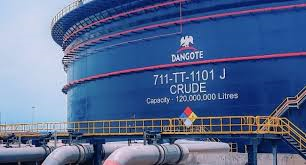The completion and operationalization of the Dangote Refinery marks a pivotal moment for the Nigerian economy. After years of anticipation, the largest single-train refinery in the world, with a capacity to process 650,000 barrels of crude oil per day, stands ready to reshape Nigeria’s economic landscape. This development offers a wave of optimism for a country long plagued by the paradox of being a leading crude oil producer while heavily relying on the importation of refined petroleum products.
For decades, Nigeria has faced significant challenges in managing its oil sector, particularly with domestic refineries operating well below capacity. This has led to massive imports of refined petroleum products, draining billions of dollars in foreign exchange and creating a vulnerability to global oil price fluctuations. The Dangote Refinery changes the equation. With its full operationalization, Nigeria can significantly reduce its reliance on imports, saving the country billions annually. This shift promises to stabilize the naira, strengthen foreign reserves, and provide the government with more fiscal space to invest in critical infrastructure and social programmes.
Perhaps one of the most immediate benefits of the refinery’s completion is the prospect of job creation. The construction phase alone created thousands of jobs, and the operational phase will generate even more, from engineers to logistics specialists. This development extends beyond direct employment, however, as the refinery is poised to spur growth in ancillary sectors such as petrochemicals, fertilizer production, and manufacturing. By refining its own crude oil and producing essential raw materials locally, Nigeria can reduce the costs of energy and inputs for other industries, creating a more competitive industrial sector and driving economic diversification.
Another key advantage of the Dangote Refinery is the improvement in energy security. Nigeria’s domestic energy market has long suffered from instability, with recurring fuel shortages and fluctuating prices. The refinery’s capacity to meet local demand for refined products will ensure a stable supply, reducing the frequent price hikes that have eroded household incomes and stifled business operations. Moreover, the ability to refine crude oil locally provides Nigeria with greater insulation from global supply chain disruptions and the volatility of international oil markets. This newfound energy independence can enhance the stability of the broader economy and foster a more favorable environment for long-term investment.
The Dangote Refinery also opens the door to significant foreign exchange earnings through exports. As Africa’s largest refinery, it is not only designed to meet domestic needs but also to supply refined products to neighboring countries. By becoming a net exporter of refined petroleum, Nigeria stands to improve its trade balance and generate much-needed foreign currency. The timing is particularly opportune, as the African Continental Free Trade Agreement (AfCFTA) offers a platform for Nigeria to strengthen its position as a leading player in intra-African trade. This shift from a net importer to a net exporter represents a transformational change, one that could elevate Nigeria’s status within Africa’s growing economic landscape.
From an environmental perspective, the refinery has the potential to contribute positively as well. The use of advanced technology to produce cleaner fuels will help reduce vehicle emissions, addressing some of the environmental challenges associated with Nigeria’s rapid urbanization. While the oil industry will never be entirely green, the local production of refined products will reduce the environmental cost of transporting fuel from overseas, and the refinery’s integrated petrochemical complex will provide opportunities for cleaner industrial processes in the future.
The completion of the Dangote Refinery is, without a doubt, one of the most significant economic milestones for Nigeria in recent memory. Its impact will be felt across various sectors, creating jobs, enhancing energy security, reducing the strain on foreign reserves, and positioning Nigeria as an exporter of refined petroleum. As the country continues to diversify its economy and reduce its dependency on crude oil, the refinery stands as a testament to the power of strategic investment in infrastructure. While challenges remain, particularly in ensuring that governance and regulation keep pace with this new era, the operationalization of the Dangote Refinery offers hope for a more prosperous and self-reliant Nigeria. This is good news for a nation that has long sought to unlock the full potential of its oil resources for the benefit of its people.





